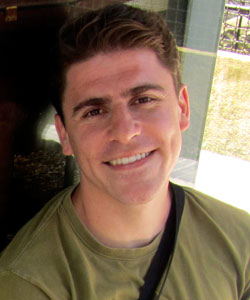Christopher Olivola
 Carnegie Mellon University
Carnegie Mellon University
https://sites.google.com/site/chrisolivola/
What does your research focus on?
I am generally interested in (human) judgment and decision making. If I had to narrow it down a bit further, I would say I am particularly interested in understanding (e)valuation: How (and why) do we assign value to things? I’ve tried to tackle this question in several ways; for example, by identifying normatively puzzling patterns of valuation, by designing new value-elicitation methods, and by contributing to the ongoing development and testing of a new decision-making theory (Decision by Sampling).
What drew you to this line of research and why is it exciting to you?
My parents were international humanitarian aid workers, so I grew up on four continents, moving between countries every few years. Being fully immersed in so many different cultures probably helped me appreciate the complexities of the human mind. But what really fascinated me was a puzzling psychological tendency that I observed everywhere we went: People’s ability to hold (and even vigorously defend) beliefs that are unsupported by evidence or which blatantly contradict other beliefs that they hold with equal conviction. The field of judgment and decision has long been interested in identifying and understanding these kinds of inconsistencies, which is why I was drawn to it. Another “perk” of this research area is that I get to work with (and occasionally battle) economists (which is not for the faint of heart).
Who were/are your mentors or scientific influences?
I’ve had a string of amazing mentors throughout my academic life. Bill Goldstein and Reid Hastie, who were my undergraduate advisors at the University of Chicago, nurtured my interest in judgment and decision-making research, and provided one of the best mentorship experiences that an overly enthusiastic (yet inexperienced) budding researcher could ask for. I wouldn’t be writing this were it not for their endless support. Then I spent my PhD, at Princeton University, working with the “tremendous trio”: Eldar Shafir, Alex Todorov, and Danny Oppenheimer (one of whom recently graced the pages of this section). Each one of them is a fabulous mentor and super-star academic in his own right, yet their research and mentoring styles are quite different; so I feel as if I got at least three-PhDs’ worth of guidance and wisdom during my time at Princeton. Finally, I owe a great intellectual debt to my postdoctoral advisor, Nick Chater. He has fundamentally changed the way I think about human cognition.
What’s your future research agenda?
I’d like to continue working on human valuation, and maybe try to examine this question in new ways (e.g., I’ve started to work with experimental philosophers). More recently, I’ve become interested in studying tacit coordination (how people manage to find solutions to strategic problems without communicating), which is an enormous field in itself. More than anything, I’ll continue to pursue the questions that I find interesting (which is always hard to predict).
What publication are you most proud of?
Olivola, C. Y., & Sagara, N. (2009). Distributions of observed death tolls govern sensitivity to human fatalities. Proceedings of the National Academy of Sciences of the USA, 106, 22151–22156.
This paper examines some key psychological and environmental factors that drive people’s reactions to humanitarian crises, natural disasters, epidemics, armed conflicts, and other deadly events. It also provides a unifying theoretical account of several well-known phenomena (e.g., the classic “Asian disease” problem). I’m extremely proud of my dissertation work, but I chose this research (a side-project in graduate school) for a few reasons. This was my first publication to come out of a project that was conceived, carried out, and completed without the supervision of a more experienced researcher. It’s got almost everything I like to see in a paper: formal theory, new predictions (generated, tested, and supported), a variety of data collection methods, cool results, even cooler graphs, Greek letters, and even Japanese characters (why not?). And to top if all off, I got to spend six amazing weeks collecting data in India.





APS regularly opens certain online articles for discussion on our website. Effective February 2021, you must be a logged-in APS member to post comments. By posting a comment, you agree to our Community Guidelines and the display of your profile information, including your name and affiliation. Any opinions, findings, conclusions, or recommendations present in article comments are those of the writers and do not necessarily reflect the views of APS or the article’s author. For more information, please see our Community Guidelines.
Please login with your APS account to comment.